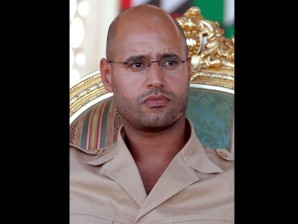TRIPOLI – Hours before he was arrested by Libyan rebels as they surged into Tripoli, Moammar Gadhafi’s son Seif al-Islam insisted that his family had “paid the price, like all Libyans.”

‘PAYING THE PRICE’. A file picture dated August 18, 2007 shows the son of Libyan leader Moammar Gadhafi, Seif al-Islam, at a ceremony marking the arrival of water from Libya’s Great Manmade River project in Ghiryan South to the city of Tripoli. Seif al-Islam has been captured, rebel leader Mustafa Abdel Jalil said on Sunday, as anti-regime fighters attacked the capital. AFP PHOTO/MAHMUD TURKIA
He did not expand on the statement, broadcast on state television Sunday, but the message was clear: all Libyans have suffered since a popular uprising broke out mid-February against his father’s 41-year autocratic rule.
Now however, the dapper 39-year-old could pay a different price altogether — a lengthy jail term — should the International Criminal Court prove the charges of crimes against humanity it has levelled against him.
On June 27, ICC judges issued arrest warrants for Seif and his autocratic father, as well as against spy master Abdullah al-Senussi, for crimes against humanity allegedly committed since Gadhafi ordered his forces to put down the revolt violently.
All three are charged over their roles in suppressing the revolt, in which civilians were murdered and persecuted by Libyan forces, particularly in Tripoli, Benghazi and Misrata, ICC prosecutor Luis Moreno-Ocampo said when the charges were announced.
The prosecutor confirmed on Monday claims by the rebels that Seif, the second of Gadhafi’s eight children, had been arrested.
“We hope he can soon be in the Hague” to face judgement, he said, adding that he planned to contact the “Libyan transitional government” later in the day.
Often presented as his father’s successor, Seif had appeared on public television several times since the protests erupted on February 15.
He held no official position but had carved out influence as a loyal emissary of the regime and as an architect of reform.
He shot to prominence in 2000 when the Gadhafi Foundation that he heads negotiated the release of Western hostages held by Muslim rebels in the Philippines.
In 2007, he served as a mediator over the 2007 release of Bulgarian nurses who were jailed as scapegoats for a hospital AIDS outbreak.
He also negotiated compensation agreements for the families of those who were killed in the Lockerbie bombing in 1988 and of UTA Flight 772 in 1989.
He long served as the face of the regime in the West as he appeared in suits and ties and spoke fluent English.
“We have a long breath,” he said in the speech on state television broadcast Sunday.
“We are in our land and in our country. We will resist for six months, one year, two years … and we will win,” he said.
“We will not submit, we will not abandon the fight,” he said. “This is not the decision of Seif al-Islam or Gadhafi but the decision of the Libyan people.
Hours after the speech was broadcast, Seif was “being kept in a secure place under close guard,” according to the chairman of the rebel National Transitional Council, Mustafa Abdel Jalil.
He would be kept there “until he is handed over to the judiciary,” Abdel Jalil told Al-Jazeera television, without giving a date or place for the capture of Gadhafi’s son.